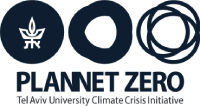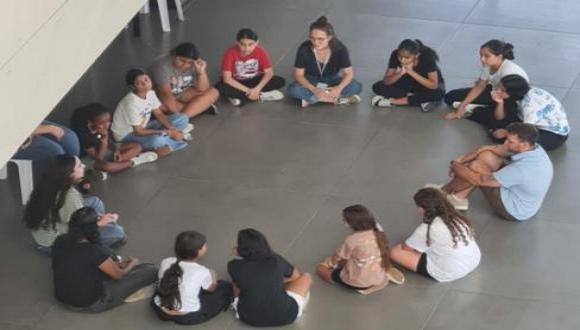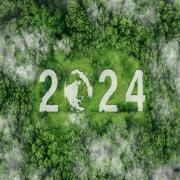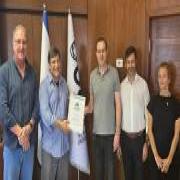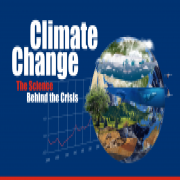Climate Ambassadors
Our students are driving the change!
The Unit for Social Involvement within the Dean of Students together with the Climate Initiative at Tel Aviv University sum up the third round of student Climate Ambassadors training.
In 2024, the Climate Ambassadors Program, one of the Climate Initiative's flagship programs, entered its third year.
Despite the many challenges of running the program over the past year, as the university timetable was disrupted by the war, the program succeeded in bringing 200 pupils to the campus to participate in this climate education program. The pupils, all aged 10-12 (grades 5-6), hailed from various cities across Israel (Lod, Ramla, Hadera, Or Yehuda, Tuba-Zangaria, and Jaffa) aged 10–12 (grades 5–6) from both Jewish and Arab schools.
The goals of the program are to introduce young pupils to higher education, encourage future academic studies, raise awareness about the climate crisis, and highlight the contribution of scientists to advancing knowledge in this field. The focus on the program is on solutions with an optimistic message about our capability to create change. The program showcases the actions we can take to address the climate crisis and the fact that we must all act together to make a difference.
Eighteen students, all recipients of TAU social impact scholarships, were trained as 'Climate Ambassadors' this year to lead the sessions with school pupils. The training sessions took place under the direction of Judi Lax, the TAU Climate Change Program coordinator, and Yonni Koren, a doctoral student and member of the Green Course climate group at Tel Aviv University, with the support of Yasmin Einav-Aharoni and Yaara Lerner from the Dean of Students.

'Climate Ambassadors' program team (left to right): Judi Lax, Yonni Koren, Yaara Lerner and Yasmin Einav-Aharon.
The training program began with a tour of the Porter School of Environmental Studies Building, led by Nadav Gofer, CEO of the "Green Step" organization, who introduced the students to cutting-edge thinking on planning according to sustainability principles. Students then attended lectures on the climate crisis, to understand the roots of the current situation, the effects on the Earth's systems and humans and, of course, the available solutions.
In the second session, the students played a unique card game called "Mesahakalim" developed for the program. The first part of the game teaches players about the sources of greenhouse gas emissions, while the second part focuses on the various solutions to reduce these emissions and their relative effectiveness. To wrap up, the students chose an action they themselves would adopt from now on to help reduce greenhouse gas emissions.
In the next session, the students carried out fun experiments to illustrate key concepts and ideas in climate science such as 'albedo' (radiation reflection) and why it matters; how scientists know the concentration of greenhouse gases in the atmosphere from before measurements began; how excess carbon dioxide increases ocean acidity; and the effect of acidity on marine animals with calcium carbonate skeletons.
In subsequent meetings, the students conducted simulations to practice all the material presented to them and also prepared for questions and scenarios they might face when working with school pupils.
This year, as part of the training, the students also visited the new "Song of the Corals" exhibition at the Steinhardt Natural History Museum, to better understand these wonderful creatures which are some of the most affected by the climate crisis.






Images from the Climate Ambassadors training sessions and sessions with pupils
Afterwards, the pupils worked in small groups with the 'Climate Ambassadors,' played the "Mesahakalim" card game, conducted experiments and demonstrations together, and learned how everyone can contribute to reducing greenhouse gas emissions.
For the first time this year, a special session was held for pupils from the Arab sector. The program materials and presentations were translated into Arabic and simultaneous translation was provided from Hebrew to Arabic by the instructors. By overcoming the language barrier, the program was made accessible to any schools in the program seeking to visit Tel Aviv University and learn about the climate crisis.
The students in the Climate Ambassadors program are undergraduates in various faculties at Tel Aviv University, including Exact Sciences, Arts, Social Sciences, Medicine, Life Sciences, and Law.
At the end of the training, the new Climate Ambassadors ran three sessions with school pupils, organized in collaboration with the "Psagot" Education for Excellence association. The young pupils began by meeting with experts – Prof. Colin Price and Dr. Orli Ronen – who explained the climate crisis, its consequences, and what can be done to solve it.
Are you interested in learning how you too can take action? Join the *Climate Initiative* newsletter at Tel Aviv University and take part in our activities to tackle the climate crisis. If you haven’t joined TAU's Climate Initiative's mailing list to get the newsletter directly to your inbox, please join here.
